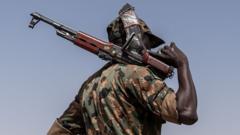The conflict in Sudan has escalated significantly as the Kordofan region emerges as a crucial battlefield between the Sudanese army and the paramilitary Rapid Support Forces (RSF). This area, rich in oil and strategically important, is vital not only for Sudan but also for neighboring South Sudan, which relies on Kordofan for its oil pipelines.
Both factions have intensified their assaults over the past months, particularly since June when the army made concerted efforts to reclaim control from the RSF, which had enjoyed numerous territorial gains, including the capital Khartoum. The humanitarian toll has been catastrophic; over 150,000 lives lost and 12 million people displaced from their homes have marked this brutal struggle.
Gen. Abdel Fattah al-Burhan, leading the army, recently visited Khartoum, which remains devastated following fierce combat. Despite his presence, the army continues to exert control from Port Sudan, indicating a lack of confidence in securing Khartoum fully. The RSF, having launched a successful coup alongside Burhan in 2021, now stands as a formidable opponent following a breakdown of their alliance.
Analysts suggest that gaining dominance in Kordofan is crucial for both sides. For the military, it would allow a push westward into Darfur, the home region of the RSF. Conversely, the RSF aims to gain momentum to reestablish its grip on central Sudan. Dr. Suliman Baldo, from the Sudan Transparency and Policy Tracker, expressed skepticism about the army's ability to breach RSF defenses, given the local support the RSF receives from the Misseriya ethnic group.
Recent airstrikes targeted civilian areas in Kordofan, further complicating the conflict dynamics and generating local resentment against the army. Civilian casualties have surged, with reports indicating over 20 deaths from airstrikes this month alone. The United Nations has condemned these attacks, calling for adherence to international humanitarian law amid rising violence from both sides.
Humanitarian organizations are also highlighting abuses, as the conflict shows no signs of abating. Satellite images suggest that the RSF has engaged in deliberate destruction, raising fears over civilian safety. The stakes in Kordofan are incredibly high, with control of this region potentially reshaping the trajectory of Sudan’s civil war. As clashes continue, the battle promises to be extensive and fraught with uncertainty regarding its ultimate outcome.
Both factions have intensified their assaults over the past months, particularly since June when the army made concerted efforts to reclaim control from the RSF, which had enjoyed numerous territorial gains, including the capital Khartoum. The humanitarian toll has been catastrophic; over 150,000 lives lost and 12 million people displaced from their homes have marked this brutal struggle.
Gen. Abdel Fattah al-Burhan, leading the army, recently visited Khartoum, which remains devastated following fierce combat. Despite his presence, the army continues to exert control from Port Sudan, indicating a lack of confidence in securing Khartoum fully. The RSF, having launched a successful coup alongside Burhan in 2021, now stands as a formidable opponent following a breakdown of their alliance.
Analysts suggest that gaining dominance in Kordofan is crucial for both sides. For the military, it would allow a push westward into Darfur, the home region of the RSF. Conversely, the RSF aims to gain momentum to reestablish its grip on central Sudan. Dr. Suliman Baldo, from the Sudan Transparency and Policy Tracker, expressed skepticism about the army's ability to breach RSF defenses, given the local support the RSF receives from the Misseriya ethnic group.
Recent airstrikes targeted civilian areas in Kordofan, further complicating the conflict dynamics and generating local resentment against the army. Civilian casualties have surged, with reports indicating over 20 deaths from airstrikes this month alone. The United Nations has condemned these attacks, calling for adherence to international humanitarian law amid rising violence from both sides.
Humanitarian organizations are also highlighting abuses, as the conflict shows no signs of abating. Satellite images suggest that the RSF has engaged in deliberate destruction, raising fears over civilian safety. The stakes in Kordofan are incredibly high, with control of this region potentially reshaping the trajectory of Sudan’s civil war. As clashes continue, the battle promises to be extensive and fraught with uncertainty regarding its ultimate outcome.




















